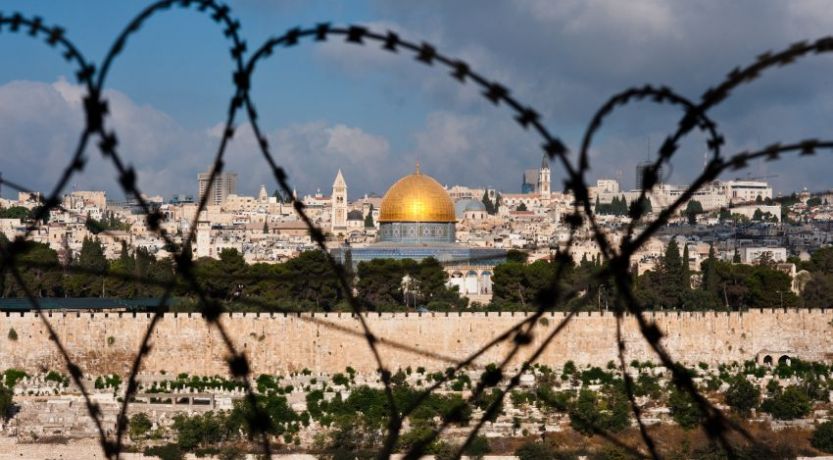With tensions between Christians, Jews and Arabs, what lies ahead for Jerusalem? Will peace come? What does the Bible say about Jerusalem in prophecy?

What does the Bible say about Jerusalem in prophecy?
Founded approximately 3,000 years ago, the city of Jerusalem has long been considered a holy city of peace—a concept embodied in its name. Although there is no consensus among scholars on the exact meaning of Jerusalem, “the oldest known form, Uru-sa-lim, has been considered by many to mean either the ‘City of Peace’ or the ‘City of (the god) Salem,’ but other interpreters, considering the name as of Hebrew origin, interpret it as the ‘possession of peace’ or ‘foundation of peace” (International Standard Bible Encyclopedia, “Jerusalem”).
But there has been little peace for the residents of this famous city. Ironically, through the centuries this city has been the site of numerous conflicts. According to Eric H. Cline, the city has been “destroyed at least twice, besieged 23 times, attacked an additional 52 times, and captured and recaptured 44 times” (as quoted in “Do We Divide the Holiest Holy City?” Moment, March/April 2008).
While the history of Jerusalem’s conflicts is easily documented, the following questions are often asked today: What lies ahead for this famous city in the end times? Will there be more strife or will it finally find the peace suggested in its name? What does the Bible say about Jerusalem in prophecy?
To answer these questions, let’s begin with an overview of tensions today.
Conflict between the Abrahamic religions
The histories of Judaism, Christianity and Islam explain why all three of these major religions claim Jerusalem as one of their holy places of worship. Springing from the same general area in the Middle East and from a common ancestor—the biblical patriarch Abraham—one would think these religions would have a special relationship with each other. But this is not the case. (See “Jerusalem: Why Three Major Religions Claim It” for historical background.)
The relationship between these closely related religions has always been problematic. Since its inception as a nation in 1948, Israel has struggled to survive; and numerous American presidents and other international leaders have tried to broker peace in the Middle East. In spite of the best of human intentions, God, through His prophets, reveals that Jerusalem will continue to be a hotbed of strife until the return of Jesus Christ to earth.
Through the pen of Zechariah the prophet, God revealed His deep love for the city of Jerusalem and His intent that Jerusalem was and would be a special place to Him in the future (Zechariah 1:14, 17; 2:12). However, God also revealed through the prophet that this special city would be a “very heavy stone for all peoples” (12:3). For thousands of years the city of Jerusalem has often been at the center of regional and world conflict.
Claims to the city
The Jews, currently representing about two-thirds of the residents of the modern city, claim longevity of possession even though they had been displaced from Jerusalem for hundreds of years and their temple was destroyed long ago. Many Jews still long for a temple to be rebuilt, and many conservative Jews would like to see animal sacrifices reinstated on the site of Solomon’s temple. Their national conquest of Jerusalem during the Arab-Israeli wars of 1967 and 1973 gave hope to many religious Jews that worship on the Temple Mount might be restored. But there are major political, religious and physical obstacles.
Christians want to maintain the fragile peace in this holy city that contains many of their churches and shrines. After all, this is where Christianity began, and any conflict between the Muslims and Jews will upset the current balance of power and could threaten Christian holy sites and the safety of the 15,000 Christians who now live in and around Jerusalem. Christians represent about 2 percent of the residents.
Muslims, approximately one-third of the population, will not give up their Al-Aqsa Mosque and the Dome of the Rock on the Temple Mount. These holy sites are far too important to Islam to consider sharing the Temple Mount with the Jews who desire to have a temple there. They still control the Temple Mount even though the Jews control the city and the territory around the Muslim holy sites.
Muslims and Jews have both said they cannot and will not share this important piece of real estate. The dangerous impasse continues. World public opinion, along with pressure from Christian churches and Israel’s allies, helps maintain the fragile peace on the Mount, in the city and in the region.
The modern State of Israel also lays claim to the city of Jerusalem because it was the capital of the ancient nation of Israel under King David (2 Samuel 5:5; 1 Chronicles 15:1-3). Most nations today do not recognize Jerusalem as Israel’s capital. The international consulates are in Tel Aviv. Again, this is done to try to maintain the very fragile and weak peace in the city and region.
Jerusalem in prophecy: Conflict ahead
The Scriptures reveal that at the time before Christ’s return to earth, this region of the world and the city of Jerusalem will once again be in turmoil and conflict. The fragile balance of peace that currently exists will be destroyed.
The prophet Daniel was inspired to write that, at the time of the end, the Jews would resume animal sacrifices and that a religious power called “a little horn” would arise (Daniel 7:8, 11, 21-22; 8:9-10). With his influence and control over the civil government—called the “beast” in Revelation 13:1-4—this man will use the army of the beast to stop these daily sacrifices (Daniel 8:12) and set up an “abomination of desolation” on what appears to be the Temple Mount (Daniel 12:11; Matthew 24:15).
In a long and detailed prophecy, Daniel also prophesied of a conflict that would occur between the “king of the South” and “the king of the North” at “the time of the end” (Daniel 11:40). Jerusalem is going to be caught in the middle of this battle. The prophecy reveals that the “king of the North” is going to “enter the Glorious Land”—a reference to Palestine. This king and his spiritual adviser will take control of the city of Jerusalem.
To read more about this religious leader and his false teaching, see “Antichrist.” Also, be sure to read “Middle East Conflict.”
Armageddon
When Jesus Christ returns to earth, a great battle is prophesied to occur. Satan the devil and his two puppet leaders, known as the beast and false prophet, will stir up the nations of the world to fight against Christ in “the battle of that great day of God Almighty” (Revelation 16:14). The staging area for this battle will be a place called “Armageddon” or Har Meggido, located about 55 miles from Jerusalem.
The battle itself will take place in Jerusalem. Zechariah prophesied that Christ would return to earth on the Mount of Olives in Jerusalem and that the conflict will envelop the city (Zechariah 14:1-4). Prophecies show that Jesus Christ will destroy those nations that come up against Jerusalem (12:9; 14:2-3, 12).
Jerusalem after Christ’s return
After Christ’s return, Jerusalem will be rebuilt (Zechariah 1:16), and a new temple will be constructed in the city (6:13, 15). With the wealth of the surrounding nations gathered together (14:14), funds will be readily available for the building of a new, magnificent temple that will be the place of worship for all people in the newly established Kingdom of God (14:16-19). Healing waters will flow from the temple and Jerusalem to the rest of the earth to provide physical and spiritual healing to all nations (Zechariah 14:8; Ezekiel 47:1-12).
Then, and only then, will Jerusalem be the “City of Peace.” As the prophet Zechariah noted, “The people shall dwell in it; and no longer shall there be utter destruction, but Jerusalem shall be safely inhabited” (Zechariah 14:11).
To learn more about the Middle East, be sure to read the articles in this section on the “Middle East in Bible Prophecy.”





